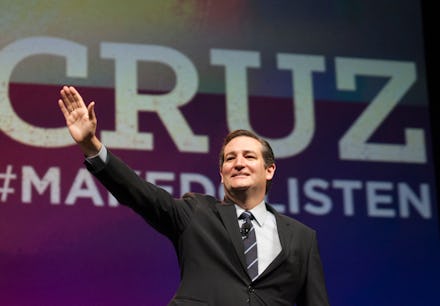7 Quotes Show Why the Tea Party Just Doesn't Get Millennials

Even though Republicans are slated to win the Senate tomorrow, as well as the millennial vote, they shouldn't get too excited too fast. The GOP has been working to fix its struggles in appealing to young voters, but it seems that part of the party isn't onboard.
Tea party conservatives could prove to be a big roadblock in Republican's efforts to win over the generation. Although plenty of Americans have been swept up in the ultra-conservative rhetoric of the tea party movement, those Americans are not millennials.
According to Pew, this faction of the Republican Party captures the sentiments of only 15% of millennials, those who describe their political views are "mostly" or "consistently conservative." This marks a significant shift from other generations. For example, among the "Silent Generation" — those born during Great Depression and World War II — 38% of respondents characterize their political views as conservative.
As it stands, the tea party's days are likely dwindling. Gallup reports that millennials are becoming increasingly liberal on social issues, and increasingly less critical of the government. The tea party is moving in the opposite direction. Need proof? Here are seven quotes that embody just how off the mark the tea party is on important issues most important for millennials.
On the First Amendment:
"The exact phrase 'separation of Church and State' came out of Adolph Hitler's mouth, that's where it comes from. So the next time your liberal friends talk about the separation of Church and State, ask them why they're Nazis."
– Glen Urquhart, candidate for the Delaware Senate and House in 2012 and 2010, respectively
Aside from the absurdity of citing Hitler as a source for a line from the First Amendment, the statement also strikes a sour chord with the millennial trend toward religious disaffiliation. Three in 10 millennials aren't involved with any religion, which is the highest number of any generation that Pew has polled. Religion doesn't define millennials, and millennials don't want religion to define the government.
On global warming and climate change:
"I absolutely do not believe in the science of man-caused climate change. It's not proven by any stretch of the imagination... It's far more likely that it's just sunspot activity of just something in the geologic eons of time. Excess carbon dioxide in the atmosphere 'gets sucked down by trees and helps the trees grow.'"
– Sen. Ron Johnson (R-Wis.)
(Johnson has also said, "I'm glad there is global warming.")
Millennials absolutely do believe in the reality of global warming. Environmental issues are a chief concern for millennials, and polls have shown that 71% think we should "'do whatever it takes to protect the environment' and 51% say that 'stricter environmental laws and regulations are worth the cost.'" A Mic political survey found that, unlike Johnson, millennials actually view climate change as the No. 1 most significant international issues facing the U.S.
On immigration:
"The first thing that has to be done is secure the border ... East Germany was very, very able to reduce the flow. Now, obviously, other things were involved. We have the capacity to, as a great nation, secure the border. If East Germany could, we could."
– Joe Miller, two-time Alaska Senate candidate
Millennials, on the other hand, largely view immigration as beneficial to the U.S. The Pew poll found that 78% of Democratic millennials and 57% of Republican millennials believe that "immigrants strengthen our country." The tea party seems more concerned about the strength of border fences.
On race:
"So that's what we want, is a secure and sovereign nation and, you know, I don't know that all of you are Latino. Some of you look a little more Asian to me. I don't know that. What we know, what we know about ourselves is that we are a melting pot in this country. My grandchildren are evidence of that. I'm evidence of that. I've been called the first Asian legislator in our Nevada State Assembly."
—Sharron Angle, member of the Nevada Assembly from 1999 to 2007 and nominee for the Nevada Senate in 2010
Millennials tend to be incredibly concerned about tolerance, diversity and equality, and a large percentage of the generation aspires to be colorblind. The tea party, on the other hand, has a problem with race. A study published by Social Science Research found that tea party members tend to be fueled by racial resentment, particularly toward blacks and Latinos.
On evolution:
"You know what, evolution is a myth. Why aren't monkeys still evolving into humans?"
—Christine O'Donnell, former Republican Party candidate and conservative activist
Millennials disagree. More millennials support the theory of evolution than any other generation. Salon reports that whereas just 49% of adults over the age of 65 accept evolution, 68% of millennials do.
On the media:
"The greatest threat to America is not necessarily a recession or even another terrorist attack. The greatest threat to America is a liberal media bias."
–Rep. Lamar Smith (R-Texas)
Millennials might share in the tea party's distrust of the media, but their distrust isn't necessarily biased in one way or another. In fact, millennials distrust the political process and institutions in general. In April, the Harvard Institute of Politics found that just 11% of millennials trust the media.
On guns:
"It's not unusual in political rallies, it's not unusual in parades, to see that type of thing."
– Joe Miller, two-time Alaska Senate candidate explaining why it was completely normal to see guns at a speech he gave
Millennials have seen a lot of gun violence in their time. Between 2000 and 2013, the Wire reports that there have been 160 mass shooting incidents. In light of this, millennials aren't so unconcerned when it comes to guns. Forty-nine percent of millennials favor stricter gun laws.